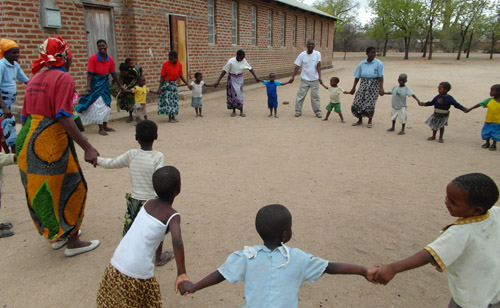Reach Forward: Making educational research count for children with disabilities in Malawi, Kenya and Uganda
The Reach Forward Project aimed to address the exclusion of children with disabilities in Africa from quality education. It did so by establishing a wide network of partners from a variety of sectors including UK and African universities, non-governmental organisations, educational managers and coordinators, practitioners and government staff in Kenya, Malawi and Uganda.
This one-year project (2013 - 2014) is funded by the Economic & Social Research Council (ESRC) as part of the Knowledge Exchange Opportunities theme and Sightsavers.drew on existing primary research to address a number of issues around the current educational support available for children with visual impairment and those with other disabilities, focusing on Malawi, Uganda and Kenya. The ultimate goal was to strengthen the capacity of partners in the South allowing them to set their own research agendas and inform the development of effective education systems.
The main objectives are to:
- develop a network of Northern and Southern collaborators as well as end-users, policy makers, managers, practitioners and civil society organisations involved in supporting the education of children and young people with disabilities in three countries;
- discuss, critique and apply different approaches, methods and ethical issues from previously funded projects and apply them to local contexts;
- identify core principles across the research findings to test their suitability for application across a broader disability agenda;
- set up an online community whereby practitioners and researchers can extend their knowledge of how to support children and young people with disabilities and identify sets of research-related tools and activities.
Members of the research project
- Paul Lynch Principal Investigator
- Elena Schmidt Director of Strategic Programme Development, Innovations, Evidence and Research
- Nidhi Singal Co-investigator
- Emma Jolley Research Associate
- Helen Lundebye Technical Advisor
- Graeme Douglas Co-investigator
- Mika H. Mankhwazi Malawi Co-ordinator
- Lawrence Eron Uganda Co-ordinator
- Solomon M. Wambua Kenya Co-ordinator
- Björn Haßler Innovation Consultant
Long and short term impact
All resources developed during the lifetime of the project are shared through a dedicated online community and have been made accessible to a wider audience.

Evidence-based practices in inclusive education in the global South have been strengthened and the profile of educating children and young people with disabilities into the post-2015 international debates has been increased .
As part of our medium and long-term strategy of engagement with our user-groups, we produced short updates of the project through Twitter Feeds and publicised the seminars on Facebook. We worked with international organisations that work in education and disability in the the global South such as International Disability and Development Consortium (IDDC), Sightsavers and other organisations that represent the educational interests of children with disabilities.
Our key long-term impact will be in establishing high quality educational programmes to support the educational inclusion of children and young people with disabilities in the global South.